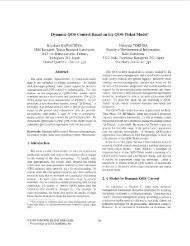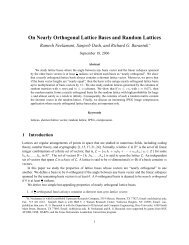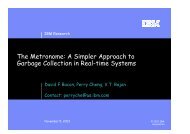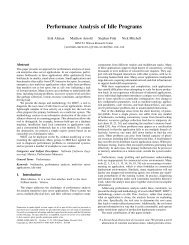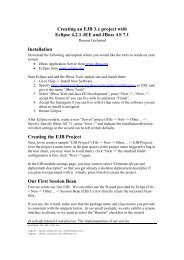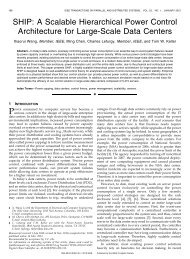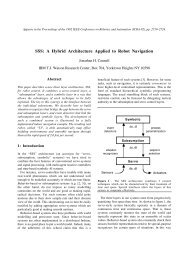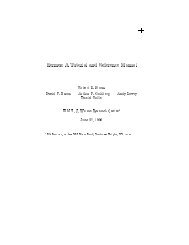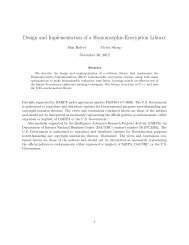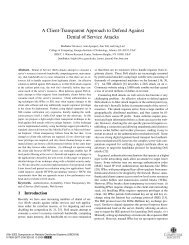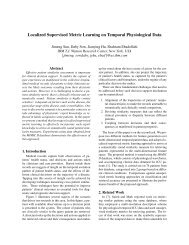Ownership You Can Count On: A Hybrid Approach - Researcher - IBM
Ownership You Can Count On: A Hybrid Approach - Researcher - IBM
Ownership You Can Count On: A Hybrid Approach - Researcher - IBM
You also want an ePaper? Increase the reach of your titles
YUMPU automatically turns print PDFs into web optimized ePapers that Google loves.
error if they occur; we will not discuss this possibility further<br />
here.<br />
6.2 Polymorphism<br />
The Gel type system does not support any sort of<br />
polymorphism between owning and non-owning types. This<br />
means that it's not possible to write a method which can receive<br />
either an owning or non-owning pointer as an input parameter. It's<br />
also not possible to implement a single data structure (such as a<br />
tree or hash table) which can hold either owning or non-owning<br />
pointer. This limitation is reflected in the Gel class library, which<br />
contains separate ArrayList and NonOwningArrayList<br />
classes.<br />
It would be useful to extend Gel with generic types as found<br />
in Java and C#, allowing a generic type to represent either an<br />
owning or non-owning type. As a simple example, suppose that<br />
we'd like to implement a class Pair which holds two objects<br />
of type T. We'd like to be able to instantiate the class using either<br />
an owning or non-owning pointer type. Our generic type system<br />
might allow this as follows:<br />
class Pair {<br />
T first, second;<br />
Pair(T first, T second) {<br />
this.first = first;<br />
this.second = second;<br />
}<br />
T% First() { return first; }<br />
T% Second() { return second; }<br />
}<br />
The system includes a type operator % which can be applied<br />
only to a generic type, and which removes ownership from a type.<br />
In particular, if T is Foo ^, then T% is Foo; if T is Foo, then T% is<br />
also Foo.<br />
A generic type system for Gel should also support covariance:<br />
it should be possible to write a single function which can take<br />
either a Pair or a Pair as a parameter, and<br />
similarly it should be possible to write a single function which can<br />
take either a Foo[] or a Foo^[] as a parameter.<br />
We believe that it should not be difficult to design a complete<br />
generics system for Gel including covariance, but we will not<br />
explore the idea further in this work.<br />
6.3 Multithreading<br />
As described above, the Gel compiler's reference count<br />
elimination optimization will work only in single-threaded<br />
programs; this is a significant limitation.<br />
It would be useful to extend Gel to be able to execute<br />
multithreaded programs safely and efficiently. We can imagine<br />
two different possible approaches here. First,it might be possible<br />
to extend Gel's optimizer to be able to infer that many data<br />
structures are accessed only from a single thread; then reference<br />
counts in such structures could be optimized away using the<br />
existing algorithm. Such inference seems difficult and we are<br />
relatively pessimistic about such an approach.<br />
As another approach, we could possibly extend Gel so that<br />
objects are grouped into apartments which may be accessed from<br />
only a single thread at once. With this approach, the existing<br />
optimization algorithm could be used to eliminate reference count<br />
accesses in code which executes inside a single apartment. It<br />
might be possible to design system which guarantees that only<br />
pointers of a certain kind may cross apartment boundaries and<br />
which allows groups of objects to move efficiently between<br />
apartments; we leave this to further work.<br />
7. RELATED WORK<br />
Our work represents one of many attempts to find a "sweet<br />
spot" in the trade-off space between fully manual and fully<br />
automatic memory management (that is, garbage collection).<br />
There are many inter-related issues, chief among them being<br />
memory footprint, run-time cost, determinism, and ease of<br />
programming. We compare our work to that of others across these<br />
various axes.<br />
Region-based memory management [15] provides bulkfreeing<br />
of objects, often based on a stack discipline. Regions<br />
generally provide low cost and good determinism, but if provided<br />
in a safe manner either require either burdensome annotation [19]<br />
or an analysis which is frequently over-conservative [2]. Region<br />
systems that follow a stack discipline often suffer from large<br />
numbers of object being assigned (by analysis or by the<br />
programmer) to the global region which is never collected (or<br />
must be collected by a supplementary garbage collector).<br />
The Real-time Specification for Java [3] provides a stackoriented<br />
region-based memory management based on scopes.<br />
Scopes have neither annotations nor automatic inference; instead<br />
it is the responsibility of the programmer to allocate objects in the<br />
correct scope. Storing a pointer that violates the stack discipline of<br />
scopes causes a run-time exception. Scopes are thus type-safe but<br />
subject to run-time exceptions that are difficult to prevent and are<br />
highly dependent on interactions between different components.<br />
In addition, it is often either convenient or necessary to place<br />
objects in the outermost scope (called Immortal memory), in<br />
particular when it is necessary to share objects between scopemanaged<br />
and garbage-collected memory.<br />
Gay and Aiken [12] suggest the use of reference counted<br />
regions that need not follow a stack discipline. Safety is ensured<br />
because explicit freeing is not allowed to succeed unless the<br />
region's reference count has dropped to zero. They include<br />
annotations for specifying that pointers are in the same region or<br />
are pointers to parent regions; updates of such pointers do not<br />
change reference counts. Although the granularity and abstraction<br />
level are different from ours, these annotations also allow them to<br />
optimize away a large fraction of reference counting operations.<br />
The goals of the Cyclone language [17] are probably most<br />
similar to those of Gel; its goal is to provide a safe alternative to C<br />
for systems programming. Cyclone provides several forms of safe<br />
memory management: regions, unique pointers, and reference<br />
counting. Cyclone's regions require explicit annotations in the<br />
source code, and can be both lexically scoped (in the style of<br />
[Tofte 1]) or dynamically scoped. In the latter case, if a region is<br />
freed dynamically subsequent attempts to access objects in that<br />
region will generate a run-time exception.<br />
Cyclone's unique pointers are based on linear types [13] and<br />
are essentially like Gel's owning pointers, but without the<br />
capability to reference count non-owning references. Some<br />
polymorphism across memory management styles is provided by<br />
allowing sets of unique pointers to be temporarily treated as<br />
though they belong to a region. Cyclone also provides explicit (but<br />
safe) reference counting; reference counted objects are treated as<br />
belonging to a special region called RC.<br />
The experience of the language designers in writing the<br />
Cyclone compiler is instructive: first coarse-grained regions were<br />
used, which reduced the annotation burden. However, coarse<br />
regions did not free memory soon enough and led to excessive<br />
space consumption. The compiler was then rewritten using finegrained<br />
regions, at which point the annotations became overly<br />
cumbersome. Eventually the compiler was rewritten to use<br />
garbage collection [Greg Morrisett, personal communication].



